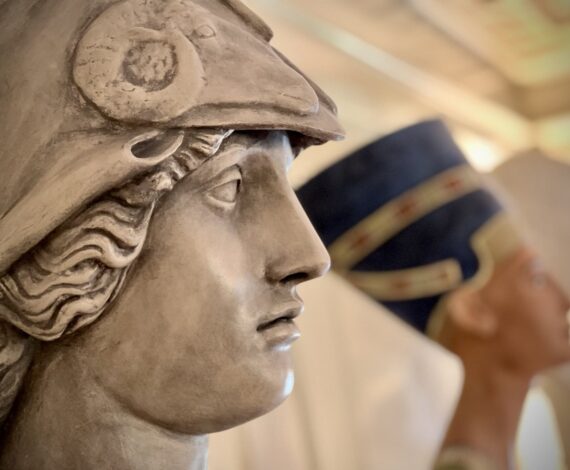Classical Languages
Classical Languages
Classical Languages
Classical Languages
Experience the joy of reading Greek and Latin authors in the original. Learn Latin from Ludus and Greek from ΑΓΩΝ, textbooks written by members of the Classical Languages...
Roman Satire
Classical Languages
Roman Satire
This course explores the meaning of the Roman interpretation of satire (satura, meaning “medley”) and how the literary form developed from an improvisational, personal story set to meter to a light-hearted yet dagger-sharp form of social...
Tacitus
Classical Languages
Tacitus
Agrippina, the sister of Caligula, wife of Claudius, mother of Nero, was at the heart of the power and intrigues of the Julio-Claudian emperors for several decades. She is one of the most colorful characters in Tacitus’ history of that period with...
Martial and Petronius
Classical Languages
Martial and Petronius
Although they wrote in different genres – Martial was a master of the epigram, while Petronius wrote something resembling a modern novel – the works of these first century CE authors are both written in language that is closer to the street than...
Intermediate Latin
Classical Languages
Intermediate Latin
This sequence continues to introduce students to additional forms and syntax, including the subjunctive mood. After completion of this material, students will have their first taste of authentic, unadapted Latin prose. Not just a general, conqueror and...
Elementary Latin – Intensive
Classical Languages
Elementary Latin – Intensive
This introductory sequence serves two purposes: First, it offers students who have studied Latin previously, but are not placed into LAT210, a slightly condensed and accelerated path through the material covered in LAT110-230. Second, it satisfies the Latin...
Intermediate Latin: Conversational
Classical Languages
Intermediate Latin: Conversational
Dr. Daniel Gallagher of Cornell University has said, “Latin, like any language, is mastered only when one can speak it. Yet the goal of spoken Latin, unlike modern languages, is not necessarily conversational fluency. Rather, by formulating one’s...
Cicero
Classical Languages
Cicero
Quintilian said, “For posterity, the name of Cicero has come to be regarded as the name of eloquence itself.” In this course, students will read Cicero’s First Oration Against Catiline and discover how the consul Cicero used his rhetorical...
Latin Prose
Classical Languages
Latin Prose
Students will read selections of Latin prose from Caesar, Cicero, Pliny, Sallust, Seneca, Tacitus and the Acts of the Apostles in the Vulgate. What these selections all have in common is that they reveal the attitudes of elite Roman men toward women, slaves...
Ovid
Classical Languages
Ovid
This course offers an introduction to poetry and meter through selections from Ovid’s Metamorphoses, the epic poem that breathes life into our understanding of so many Greco-Roman myths. The flight of Daedalus and Icarus, the love of Pyramus and Thisbe,...
